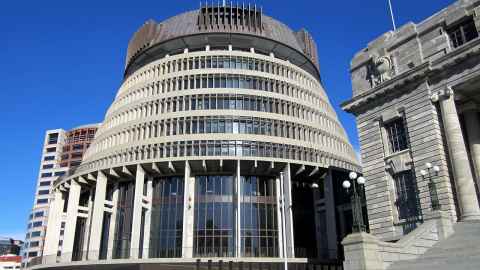Tricky select committee - it’s just not cricket
15 February 2019
Opinion: Claiming political advantage by not engaging in important political work shows a profound lack of understanding, writes the Law School's Edward Willis.

There’s a tricky move that almost every school-age cricketer tries on (or at least thinks about trying on) at some point in their burgeoning career. Running in to bowl, the player rolls their arm over but fakes actually delivering the ball. The batter at the non-striker’s end thinks the ball has been delivered, and steps out of their crease in anticipation of running between the wickets. The bowler — still with ball in hand — removes the bails at the non-striker’s end and runs out the hapless batter.
Technically, this move is completely valid. However, you hardly ever see it at a professional level. The few times it does occur, it’s generally frowned upon. The conventions of the game of cricket dictate that whatever the rules might technically say, it’s just not the done thing to pull this kind of trick at the non-striker’s end.
For the good of the game, you focus on getting the batter out with skill and strategy, tight bowling and clever field placement. You metaphorically ask the question of the batter’s right to occupy the crease by applying legitimate pressure delivery after delivery (knowing full well the same question will be asked of you once it’s your turn to bat). Mature, professional cricketers (even Australian ones) understand this. School-age cricketers do not.
I think this is a good analogy for something that happened at Parliament on Wednesday morning. When the Finance and Expenditure Select Committee was due to meet, the National Party-affiliated members of that Committee stood out in the corridor rather than join the meeting. This meant that there wasn’t a quorum for the meeting to begin, and so it was adjourned.
Technically, this was all in line with the rules of Parliament (and a good account that includes the technicalities is given here by Professor Andrew Geddis). It allowed the National Party to claim that, as the Opposition, they had scored some points over the Government (apparently because it helps demonstrate that the Government isn’t good at governing, or something?). But it wasn’t in line with the conventions of the game of politics, or how select committee members are supposed to conduct themselves.
The National MPs involved had the power to ensure that the select committee meeting went ahead. They purposefully declined to exercise that power, for reasons only they will ever fully know.
In short, it’s the sort of move amateurs might pull to win a cheeky advantage. But mature people who understand that there are bigger issues at stake wouldn’t want to be associated with this kind of behaviour. Let’s briefly examine why.
Despite being made up of politicians, select committees are broadly bi-partisan institutions. They examine issues on behalf of Parliament as a whole, which is itself a bi-partisan institution. A key part of the work select committees do is ensuring accountability of the Government through the ability to ask questions and examine evidence.
Now, this aspect of their work can take on a bi-partisan flavour. Obviously, it is in the interests of Opposition MPs on select committees to use the process to try to embarrass the Government. But that’s okay, if it's done in the forum of the meeting itself - it's no different than bowling a tight line in our cricketing analogy. Select committees ask tough questions of the Government, and Opposition members know that if they ever become ministers they will face the same tough questions.
Ensuring that select committees work this way is rightly seen as more important than scoring cheap political points. We could say that there are constitutional principles involved that outweigh the usual political imperatives. But to prevent a select committee from meeting in the first place does nothing to hold the government to account in a constitutionally appropriate way. Like running the non-striker out without even bowling the ball, it doesn’t let us know who is actually better at the game of cricket (or politics).
To claim a political advantage as a result of not engaging in important political work, which members of the National Party sought to do yesterday, shows a profound lack of understanding about the game they are supposed to be playing. They weakened the constitutional principles about how we effectively hold the Government to account for the sake of a cheap headline.
National MPs have justified their behaviour on the basis that a Government member of the Committee had turned up late. National MP David Carter put it in these terms: “It’s the government’s job to maintain a quorum and be organised. They called the meeting. They are expected to get out of bed and start at 8am.”
This justification only holds water if you ignore the distinction between constitutional principle and politics. In fact, it risks redefining constitutional principles so that they become nothing more part of a political contest, where every government activity is hyper-partisan.
While it’s great if all MPs turn up on time, just like it’s great if the non-striker doesn’t wander out of their crease, it doesn’t really justify National’s behaviour in this case. The National MPs involved had the power to ensure that the select committee meeting went ahead. They purposefully declined to exercise that power, for reasons only they will ever fully know. Rather than chose to play the game, they choose to be tricky. Let’s hope this kind of politicking doesn’t happen again, because it’s just not cricket.
Dr Edward Willis is a lecturer at the Faculty of Law. This article reflects the opinion of the author and not the views of the University of Auckland.
Used with permission from Newsroom Tricky select committee - it’s just not cricket published on 18 February 2019.